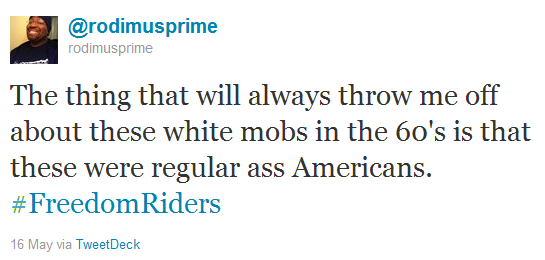 |
| Twitter user KismetNuñez draws her own distinct connection between the Civil Rights revolution of the 1960s and the banner under which slavery made its last stand in the US. |
The impulse makes sense. We care about these places. We care about them for specific reasons. So we lay out a brilliant thesis, we build the evidence to support that thesis and then we spring the conclusory trap and tell the audience what they should take away from the resource.
Civil War sites are certainly not alone in this impulse, but they're some of the most typical. I go on tours whenever I visit a battlefield, just as closely watching how an interpreter crafts the tour as much as what they say. Tours are organizied, far and wide on Civil War landscapes held by local communities and on the national level, around a thesis statement. "General Phineas P. Humperdink stopped the Federal assault with a charge and turned the tide of the battle."
But that's not a theme, and certainly doesn't speak to a visitor. It's an academic thesis. A theme is far more broad. We should want people to walk away feeling a site, not necessarily having been slapped in the face by an encyclopedia's worth of facts. A theme is "human suffering," or "heartache," or "pride," or "sacrifice." It is a human universal: understandable by anyone anywhere.
"But," you argue, "they're not smart enough to get it."
I think you're wrong, Mr. Strawman.
I watched American Experience's documentary Freedom Riders on Monday night. As it started, I was browsing Facebook and saw a #hashtag for the documentary: #FreedomRiders
So I watched in my living room, sitting on my couch alongside a racially diverse crowd of thousands. We cried together. We gasped together. We cheered together. Watching on Twitter was like seeing it in a crowded theatre. It was like following along with a Ranger on an interpretive program on a physical landscape.
But the genius of Freedom Riders was its structure. It has no narrator. It has no guiding voice. It is a carefully chosen oral history narrative, without a swift two-by-four of a conclusion.
So, did we get it? Let's judge by the tweets... (after the jump)
First, watch this video (Warning: strong, but keenly important and unvarnished language):
Watch the full episode. See more American Experience.
In response, @shelviswv posted...
Another user, @rodimusprime posted the following:
@CJCrewsTheGreat saw the documentary (and the student trip mirroring the events of 50 years ago) as a call to action, noting that...
@MrDubya64 was floored by how recently the savagery of the segregated South threatened the lives of students asking for change:
There are thousands (quite literally) of other tweets of people reacting to the presentation. Each took their own meanings. Each drew their own conclusions. And each is valid within the context of their own lives.
What does all of this mean? First, Americans are clamoring for something... anything which commemorates the Civil Rights Movement. But there's not much out there being planned. This vacuum is a shame, but is equally an opportunity for the Civil War world.
Secondly, people are making their own connections between the peaceful Civil Rights Movement of the 1960s and the violent Civil Rights Movement of the 1860s already. They are drawing the lines themselves. If we don't begin offering opportunities for these folks to see their own stories on Civil War landscapes, we take another step toward complete irrelevance in the public consciousness.
So, Mr. Strawman, you can commemorate the Civil War Sesquicentennial acting blissfully ignorant of the deep impacts of that war and the inherent connections with the fiftieth anniversary of the Civil Rights Movement. They're going to make those connections themselves. Why bother, right?
Wouldn't it be better, though, to join that conversation and encourage it? If we don't acknowledge those connections, we risk the public seeing Civil War historians as aloof, disconnected and meaningless.




So, no one responds to any of your blogs so you just make up a conversation now - kind of sad don't you think?
ReplyDelete